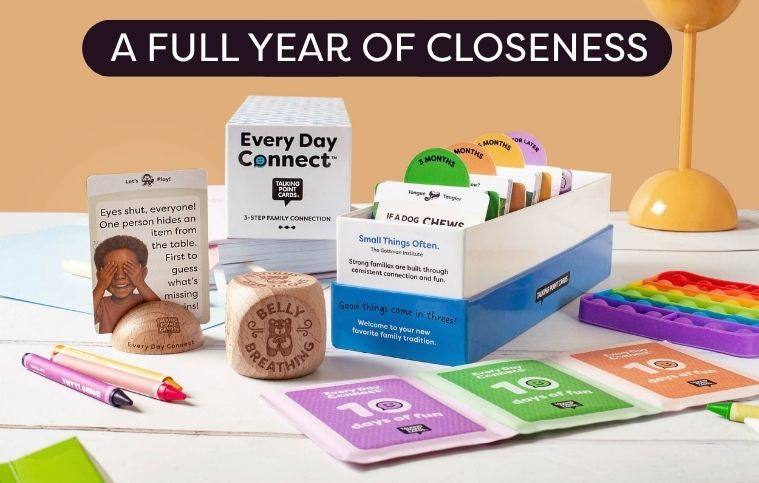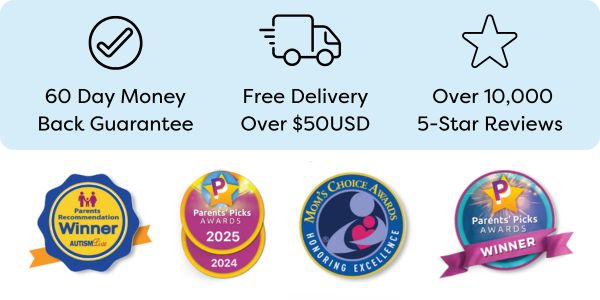SHOP
About
The Afternoon That Broke The Ice
When Kids Feel Safe To Share
The Power of The Right Question At The Right Time
Why Traditional Parent Questions Fall Flat
The Accidental Discovery Of Real Connection
What Changed After The One Conversation
The Questions That Actually Work
Building Connection Without Pressure
When Your Kids Actually Wants To Talk
The Ripple Effect Of Real Questions
The Tool That Changed Our Kitchen Conversations
The Long Game Of Connection
The Gift Of Being Truly Seen
Shop Family Products
You know that feeling when your kid walks through the door after school and you ask, "How was your day?" only to get the classic grunt-and-shrug combo?
Yeah. I've been living that reality for months.
My 14-year-old Emma used to be my little chatterbox. She'd bounce off the bus with stories about her friends, her teachers, the weird thing that happened in the cafeteria. But somewhere between middle school and now, she'd turned into this... mystery person who lived in my house and occasionally emerged for snacks.
The "how was your day" question had become this weird daily ritual where I'd ask, she'd mumble "fine," and we'd both pretend that was actual communication.
Until last Tuesday changed everything.
The Afternoon That Broke the Ice
Emma came home and headed straight for the kitchen like always. I was making my usual attempt at connection while she assembled what I can only describe as a nutritional nightmare involving peanut butter, crackers, and way too much chocolate.
But instead of my usual "how was your day" interrogation, I pulled out this question card I'd been keeping in the kitchen drawer. (Yes, I'd been hoarding conversation starters like some kind of desperate parent prepper.)
The card asked: "What's the best piece of advice you've ever been given?"
I almost didn't ask it. It felt too... intentional? Too much like I was trying too hard?
But something made me just throw it out there while she was mid-snack construction.
And then the most amazing thing happened.
She actually stopped. Put down her spoon. And started talking.
When Kids Feel Safe to Share
Teens need their own space but they also need their parents, and I think I'd been so focused on giving her space that I'd forgotten about the bridge-building part.
Emma told me about this conversation she'd had with her art teacher last month. About how the teacher had said, "Your mistakes don't define your potential - they just show you where to aim next."
But then she kept going.
She talked about how she'd been struggling in math but was too embarrassed to ask for help. How she thought I'd be disappointed if I knew she was having trouble. How her friend group had been weird lately and she wasn't sure where she fit in anymore.
Twenty-seven minutes. I counted afterward because I couldn't believe it.
Twenty-seven minutes of my daughter actually sharing her inner world with me, all triggered by one thoughtful question that wasn't about her day or her homework or whether she'd cleaned her room.
The Power of the Right Question at the Right Time
Here's what I realized sitting there in my kitchen, watching my daughter open up like a flower: if you want your teens to talk to you more, you must give them your attention. But it's not just about attention - it's about asking questions that actually matter to them.
"How was your day" is surface-level stuff. It's the conversational equivalent of asking someone about the weather. Safe, expected, and completely forgettable.
But "What's the best advice you've ever been given?" That hits different. It assumes they've had meaningful experiences. It treats them like someone whose thoughts and insights matter. It gives them permission to share something real.
And that's exactly what Emma did. She shared something real, which led to something else real, which led to the kind of conversation I'd been missing for months.
Why Traditional Parent Questions Fall Flat
Let's be honest about why our usual go-to questions don't work anymore:
"How was school?" translates to "Give me a quick summary so I can check 'caring parent' off my list."
"What did you learn today?" sounds like homework disguised as conversation.
"Did anything interesting happen?" puts them on the spot to perform entertainment for you.
No wonder our kids shut down. We're essentially asking them to give us a daily report when what they really want is to be seen as complex human beings with real thoughts and feelings.
One thing I've found helpful is to have a conversation with my son as though I'm a consultant, says one parent who's figured out this dynamic. And I think that's exactly right - we need to approach our kids as if their perspectives matter, not as if we're conducting an interview.
The Accidental Discovery of Real Connection
The funny thing is, I wasn't even trying to have a breakthrough moment that Tuesday afternoon. I was just tired of the same old dance we'd been doing and thought I'd try something different.
But that's maybe the point? The best conversations happen when they don't feel forced or agenda-driven. When they feel like genuine curiosity rather than parental surveillance.
After Emma finished talking about the advice from her art teacher, I shared a piece of advice that had stuck with me from when I was her age. And suddenly we were having this back-and-forth conversation where we were both just... people. Not just mom and daughter stuck in our usual roles.
She asked me what high school was like for me. I told her about my own friend drama and the time I failed a biology test and was convinced my life was over. She laughed - actually laughed - at my dramatic teenage stories.
What Changed After That One Conversation
I wish I could tell you that Emma became an open book overnight and now we have deep philosophical discussions every day. That would make for a better story, right?
But real life is messier than that.
What did change is that she started lingering in the kitchen after school sometimes. Not every day, but enough that I noticed. And when she does stick around, I've gotten better at asking questions that actually invite her to share rather than just giving me information.
She still has days where she grunts and disappears into her room. She's still a teenager who needs space and privacy and time to figure things out on her own. But now we also have this... connection point. This understanding that we can have real conversations when the moment feels right.
The other thing that's different? I've stopped taking her quiet days personally. It is fine to explain to your child that you are there for them, that you are ready to talk and listen any time. Do not force the conversation if your teen is not able to describe what is going on for them. Some days she needs space, and that's okay. Some days she's ready to talk, and I try to be ready to listen.

Rated #1 Family Product
Strengthen family bonds, spark fun and meaningful conversations, and create connection that lasts.

The Questions That Actually Work
Since that afternoon breakthrough, I've been paying attention to which questions spark conversation and which ones fall flat. Here's what I've learned works:
Questions about experiences rather than events: "What made you feel proud this week?" instead of "What happened this week?"
Questions that assume wisdom: "What's something you've learned about yourself lately?" instead of "Are you learning anything?"
Questions that invite storytelling: "Tell me about a time when..." instead of "Did you..."
Questions that treat them as experts on their own lives: "What do you think about..." instead of "Do you understand..."
The goal isn't to trick them into talking - it's to genuinely care about their thoughts and experiences in a way that makes them want to share.
Building Connection Without Pressure
One thing I've learned is that the magic happens in the margins. Not during designated "let's have a heart-to-heart" family meetings, but during those ordinary moments when guards are down and expectations are low.
Making after-school snacks. Driving to soccer practice. Folding laundry together. These are the moments when real conversation can happen, if we're paying attention and asking the right questions.
Take time to think about the message you want to get across and carefully plan your phrasing, while avoiding coming across as if you are following a script. The key is being intentional without being obvious about it.
I've started keeping interesting questions in my back pocket for these moments. Not as conversation weapons to deploy strategically, but as genuine invitations to connect when the opportunity arises.
When Your Kid Actually Wants to Talk
The thing about teenagers is that they do want to talk - just not always when and how we expect them to.
They want to share their thoughts and get your perspective, but they need to feel like you actually care about their answers, not just that you're checking a parenting box.
They want to know about your experiences and insights, but they don't want to feel lectured or like every conversation is a teachable moment.
They want connection, but on terms that feel authentic to them, not performative for you.
That Tuesday afternoon in the kitchen, Emma wasn't just answering a question about advice. She was sharing her world with me because, for once, I'd asked about something that actually mattered to her.
The Ripple Effect of Real Questions
Here's something I didn't expect: when you start asking your kids better questions, they start asking you better questions too.
Emma has started asking me things like "What was the hardest part about being my age?" and "What do you wish you'd known in high school?" These aren't surface-level questions - they're the kind of questions that lead to real conversations.
She's also started sharing more spontaneously. Last week she told me about a book she was reading that made her think about friendship differently. This weekend she asked for my opinion on a situation with her friend group.
These conversations aren't happening because I've figured out some magic parenting formula. They're happening because we've found a rhythm that works for both of us - one where curiosity and genuine interest replace interrogation and performance.
The Tool That Changed Our Kitchen Conversations
I'll be honest - I didn't come up with that question about advice on my own. It came from a set of conversation cards I'd bought on a whim and then left sitting in my kitchen drawer for weeks.
I'd been skeptical at first. Conversation cards felt so... structured? Artificial? Like I should be able to just naturally know how to talk to my own kid.
But after seeing how one thoughtful question could unlock a twenty-seven-minute conversation with my previously uncommunicative teenager, I realized I'd been overthinking it.
Sometimes we need a little help getting out of our conversational ruts. Sometimes the right question at the right moment is all it takes to remind our kids - and ourselves - that we actually enjoy each other's company.
Those cards have become my secret weapon against the after-school silence. Not because I use them every day or turn every snack time into a guided discussion, but because they've given me a arsenal of genuine, thoughtful questions that invite real sharing.
The Long Game of Connection
The truth is, parenting teenagers is a long game. You're not going to fix years of communication patterns with one good conversation, no matter how breakthrough-y it feels in the moment.
But you can plant seeds. You can show up consistently with curiosity and genuine interest. You can ask questions that treat your kids like the complex, interesting people they're becoming rather than the small children they used to be.
Most importantly, you can create space for connection without demanding it. You can be available without being invasive. You can care deeply while still giving them room to grow.
That Tuesday afternoon in my kitchen taught me that sometimes the best parenting happens when you stop trying so hard to parent and start trying to connect human to human.
The Gift of Being Truly Seen
What Emma gave me that afternoon wasn't just information about her day or her struggles or her thoughts. She gave me the gift of letting me see her - really see her - as the person she's becoming.
And maybe that's what we're all looking for in our relationships with our kids: not compliance or performance or even constant communication, but moments of real connection where we get to see each other clearly.
The question about advice didn't just help Emma open up to me. It helped me see that my daughter has been paying attention, thinking deeply, and developing wisdom I hadn't even noticed. It reminded me that she's not just my kid - she's a whole person with her own insights and experiences and perspective on the world.
That realization has changed how I show up in our relationship. I'm less focused on managing her and more interested in knowing her. Less concerned with fixing problems and more curious about understanding her world.
And she's responded to that shift by sharing more of herself - not because she has to, but because she wants to.
----------
The conversations that matter most often happen in the most ordinary moments. Sometimes all it takes is the right question to transform after-school silence into genuine connection. What question might unlock a new conversation with your teenager today?
At Talking Point Cards, we believe that meaningful connection starts with simple, heartfelt conversations. Our collection of easy-to-use, engaging conversation starters helps families of all shapes and sizes put down their screens, lean in, and truly listen to one another - one question at a time. Because stronger families aren’t built in grand gestures - they’re built in everyday moments.
Let's Stay Connected
Love what you’re reading? There’s more where that came from. Get fresh ideas, inspiring tips, and simple ways to spark deeper conversations - delivered straight to your inbox. Because the best connections start here. Just pop in your email below to join us.
We respect your privacy. We’ll never share or sell your information. By subscribing, you agree to receive emails from us. Unsubscribe anytime.












